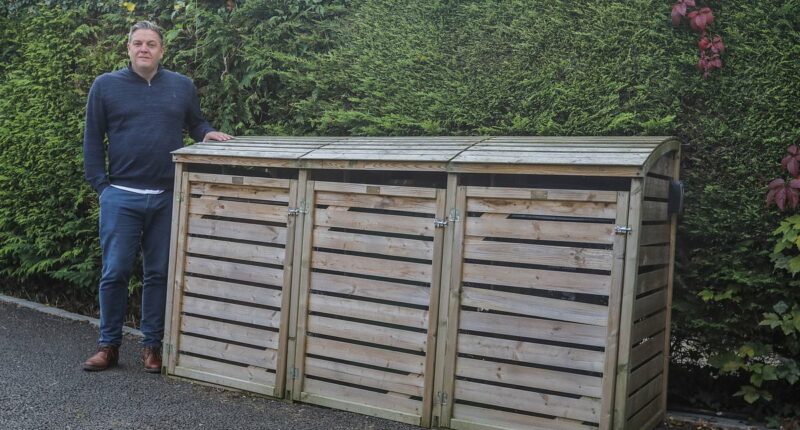Share this @internewscast.com
A couple had to dip into their daughter’s university fund to cover a £125,000 legal bill resulting from a legal dispute with their neighbor over a wooden bin store built at their £1m country house.
Kevin and Elizabeth Harrison-Ellis bought their bungalow in Goring-on-Thames, Oxfordshire, in 2020 and set about adding a first floor to the home.
Their neighbors, Stuart and Anita Hunt, living in the property behind them, did not raise any concerns initially, despite the construction affecting their scenic views.
However, once the Harrison-Ellis family erected a small wooden bin store on their driveway in 2022, the Hunts objected and initiated legal proceedings that escalated to the High Court.
They claimed the extended house had become ‘unsightly’ and resulted in a loss of ‘visual amenity’ from the windows of their £2.3m house.
The High Court ruled that the Harrison-Ellis family must pay £25,000 to their neighbors, although they are permitted to retain the changes they made to their home, known as Hillside.
Nonetheless, their legal fees accumulated to more than £100,000 over the five-year ordeal, as mentioned by Mr. Harrison-Ellis, 47, who leads sales at a renewable energy company.
He said: ‘I regret it massively. We never wanted to be put in this position, we were stuck.
‘We have had to spend all of our daughter’s university fees which we were saving for.
‘All our savings are gone just to try and defend our home.’

The addition of a small wooden bin store on the Harrison-Ellis’ driveway in 2022 prompted objections and legal action from the Hunts, eventually leading to a High Court case.

Before buying the property, the Harrison-Ellis’ were made aware of historical building restrictions which dated back to when the two properties shared the same plot, according to High Court documents. Pictured: The Harrison-Ellis’ home in Goring

Kevin and Elizabeth Harrison-Ellis bought their bungalow in Goring-on-Thames, Oxfordshire, in 2020 and set about adding a first floor to the home
Before buying the property, the Harrison-Ellis’ were made aware of historical building restrictions which dated back to when the two properties shared the same plot, according to High Court documents.
These restrictions stated they could not build anything other than a single-storey home on the land once shared by the two properties.
The Harrison-Ellis’ tried to visit the Hunts’ to discuss their plans but learnt their property was rented out.
They therefore gave the estate agent selling Hillside a letter to pass on to the Hunts, which said they were thinking of buying Hillside but wanted to add a storey to the property.
The letter said: ‘Ideally, with your permission, we would like to have the covenants removed and work alongside yourselves and the architect to come up with the best solution for all.
‘We are happy to email or to bring the documentation reference covenants for you to see.’
The Hunts received the letter but did not respond, according to High Court documents.
Without a response, the Harrison-Ellis’ went ahead and bought Hillside for £740,000 in March 2020.
They applied for planning permission for ‘a first floor extension with roof changed, new porch, and new roof above garage’.

Around December 2020, the Hunts, who paid £1m for their home in August 2019, commenced the planning process to demolish the property and replace it with a modern three-storey house
Permission was granted and building work began in June 2020.
No issues were raised during the building process, which completed in December 2020, according to High Court documents.
At around the same time, the Hunts, who paid £1m for their home in August 2019, commenced the planning process to demolish the property and replace it with a modern three-storey house.
Permission was granted in May 2021 and is currently nearing completion boosting the value of the house to £2.3m, according to court documents.
However, in January 2023 – more than two years after the completion of the extension at Hillside – the Hunts wrote to the Harrison-Ellis’ claiming they had extended their home in breach of the restrictions.
This came after they took issue with their neighbours’ bin shed, which had been built in response to the noise from the Hunts’ ongoing development.
The Hunts’ sought legal action against the Harrison-Ellis’, arguing that the conversion had changed the ‘character’ of the area, diminished the value of their home and caused a loss of privacy.
But in response, the Harrison-Ellis’ applied for the covenants to be modified to allow their extension to stay, saying that the Hunts’ objections had come from a place of ‘insincerity’.
Judge Elizabeth Cooke and Mrs Dian Martin (TD MRICS FAAV) ultimately deemed that there had been a loss of privacy for the Hunts’ in a judgement handed down by the Upper Tribunal (Lands Chamber).
However, they accepted the Harrison-Ellis’ argument that the Hunts’ ‘appeared to have been perfectly happy about Hillside until January 2023’, when the bin shed was built.
The judgment said: ‘They had no interest in the content of the restrictions until they took offence at the bin store.
‘Their reaction to the bin store makes it clear that had they been the slightest bit unhappy about the extension of Hillside they would have taken steps to check the content of the covenants while the development was happening and before it was completed.
‘It is not right to penalise the applicants now, when reversing the extension will be expensive and destructive, for the objectors’ failure to act.’
It said that it was unclear why the Hunts’ had waited ‘so long’ to look into the restrictions, adding that many issues could have been avoided had they responded to the Harrison-Ellis’ initial letter.

Judges accepted the Harrison-Ellis’ argument that the Hunts’ ‘appeared to have been perfectly happy about Hillside until January 2023’, when the bin shed was built
‘We do not suggest that their indignation at the development is entirely insincere,’ the judgment continued, ‘but we take the view that it is exaggerated, in light of the fact that they were clearly unbothered until January 2023.’
The High Court granted the Harrison-Ellis’ application to amend the covenants and permit their extension, which has boosted the value of the property to just over £1m, but ordered they pay £25,000 in compensation to the Hunts’.
They concluded: ‘In our judgment any carelessness or naivety on the part of the applicants is far outweighed by the unfairness of the objectors’ behaviour.
‘We have no hesitation in exercising our discretion to modify the restrictions so as to permit the extension of Hillside as it stands.’
‘I wouldn’t buy a house with a covenant ever again. We ended up in court and we spent over 100 thousand [pounds] fighting something we shouldn’t have had to.
Reflecting on the judgement, Mr Harrison-Ellis said: ‘It’s not nice after fighting for two-and-half years – but in a way we get to keep the house that we built.
‘We don’t know if we are going to have to pay this in a one-off sum of money.’
The Hunts were approached for comment.

















